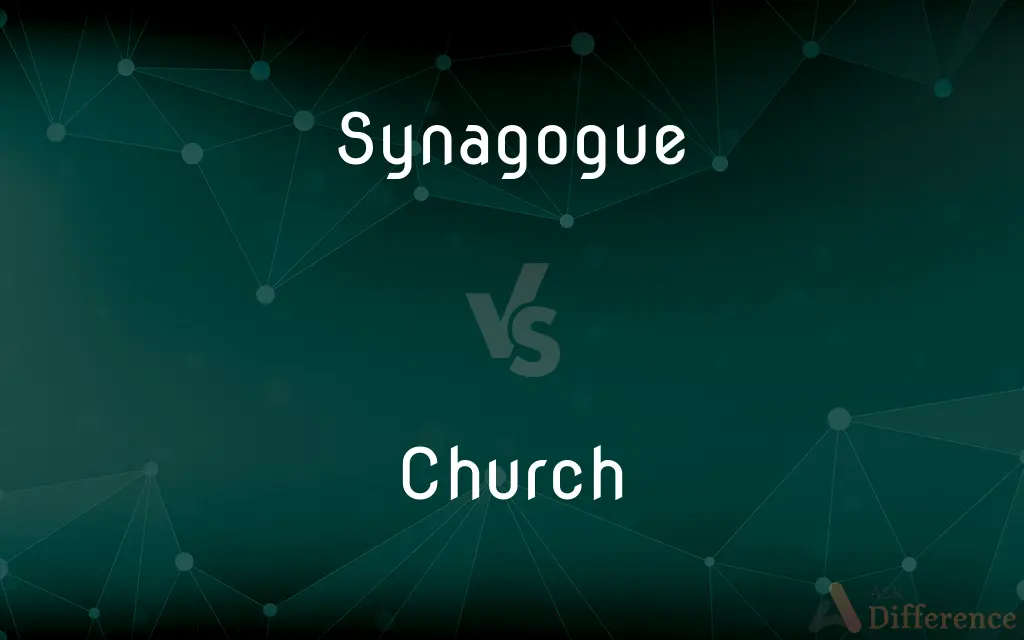Synagogue vs. Church — What's the Difference?
By Maham Liaqat & Fiza Rafique — Updated on March 8, 2024
Synagogue and church are both places of worship but cater to different religions: Judaism and Christianity, respectively.

Difference Between Synagogue and Church
Table of Contents
ADVERTISEMENT
Key Differences
Synagogues serve as Jewish worship and community centers, focusing on Torah study and prayer. Churches, central to Christian worship, emphasize the sacraments, especially the Eucharist, and sermons based on the Bible.
Synagogues typically feature a Torah ark, bimah, and often a separate section for women. Architecturally diverse, churches often have altars, pews, and religious symbols like the cross.
Synagogues are led by rabbis, who provide spiritual guidance and interpret Jewish laws. Judaism emphasizes communal prayer, Torah reading, and teaching. Churches are led by clergy such as priests or pastors, who oversee religious rites and offer pastoral care. Christianity focuses on the teachings of Jesus Christ, and church services often include hymn singing and prayer.
Comparison Chart
Religion
Judaism
Christianity
Primary Focus
Torah study and prayer
Sacraments and sermons
ADVERTISEMENT
Clergy
Rabbi
Priests, pastors, ministers
Architectural Features
Torah ark, bimah, separation of genders
Altar, pews, cross
Community Role
Center for Jewish learning and culture
Place for Christian fellowship and worship
Compare with Definitions
Synagogue
Emphasizes communal prayer, Torah reading, and education.
Members of the synagogue gathered for the daily minyan.
Church
Architectural elements often include an altar, pews, and symbols such as the cross.
The church's stained glass windows depicted scenes from the Bible.
Synagogue
A Jewish place of worship and study, often serving as a community center.
The local synagogue hosted weekly Torah studies.
Church
A Christian place of worship, central to community religious life.
The church bells rang every Sunday morning, calling the community to service.
Synagogue
Characterized by the presence of a Torah ark, bimah, and often separate seating for men and women.
The synagogue's bimah was centrally located, facilitating reading to the congregation.
Church
Led by clergy like priests or pastors, who conduct services and provide guidance.
The church's pastor was known for his engaging and thought-provoking sermons.
Synagogue
Led by a rabbi who provides spiritual leadership and interprets Jewish law.
The synagogue's rabbi delivered insightful sermons during services.
Church
Services typically involve the Eucharist, Bible readings, hymns, and prayers.
The church service concluded with a communal sharing of the Eucharist.
Synagogue
Synagogues may vary in their observance levels, from Orthodox to Reform.
The Reform synagogue held mixed-gender services and used modern music.
Church
Churches may belong to various denominations, each with distinct practices.
The Lutheran church followed a liturgical service pattern similar to Catholicism.
Synagogue
A synagogue (; from Ancient Greek συναγωγή, synagogē, 'assembly'; Hebrew: בית כנסת beit knesset, 'house of assembly', or בית תפילה beit tfila, "house of prayer"; Yiddish: שול shul, Ladino: אשנוגה esnoga, 'bright as fire'; or קהל kahal) is a Jewish or rarely Samaritan house of worship. Synagogues have a place for prayer (the main sanctuary) and may also have rooms for study, a social hall, and offices.
Church
A building for public, especially Christian worship.
Synagogue
A building or place of meeting for worship and religious instruction in the Jewish faith.
Church
The company of all Christians regarded as a spiritual body.
Synagogue
A congregation of Jews for the purpose of worship or religious study.
Church
A specified Christian denomination
The Presbyterian Church.
Synagogue
The Jewish religion as organized or typified in local congregations.
Church
A congregation.
Synagogue
A place of worship for Jews or Samaritans.
Church
Public divine worship in a church; a religious service
Goes to church at Christmas and Easter.
Synagogue
A congregation of Jews or Samaritans for the purpose of worship or religious study.
Church
The clerical profession; clergy.
Synagogue
A congregation or assembly of Jews met for the purpose of worship, or the performance of religious rites.
Church
Ecclesiastical power as distinguished from the secular
The separation of church and state.
Synagogue
The building or place appropriated to the religious worship of the Jews.
Church
To conduct a church service for, especially to perform a religious service for (a woman after childbirth).
Synagogue
The council of, probably, 120 members among the Jews, first appointed after the return from the Babylonish captivity; - called also the Great Synagogue, and sometimes, though erroneously, the Sanhedrin.
Church
Of or relating to the church; ecclesiastical.
Synagogue
A congregation in the early Christian church.
My brethren, . . . if there come into your synagogue a man with a gold ring.
Church
(countable) A Christian house of worship; a building where Christian religious services take place.
There is a lovely little church in the valley.
This building used to be a church before being converted into a library.
Synagogue
Any assembly of men.
Church
Christians collectively seen as a single spiritual community; Christianity; Christendom.
These worshippers make up the Church of Christ.
Synagogue
(Judaism) the place of worship for a Jewish congregation
Church
(countable) A local group of people who follow the same Christian religious beliefs, local or general.
Church
(countable) A particular denomination of Christianity.
The Church of England separated from the Roman Catholic Church in 1534.
Church
Christian worship held at a church; service.
Church
Organized religion in general or a specific religion considered as a political institution.
Many constitutions enshrine the separation of church and state.
Church
Any religious group.
She goes to a Wiccan church down the road.
Church
Assembly.
Church
To conduct a religious service for (a woman after childbirth, or a newly married couple).
Church
(transitive) To educate someone religiously, as in in a church.
Church
(slang) Expressing strong agreement.
- These burritos are the best!
- Church!
Church
A building set apart for Christian worship.
Church
A Jewish or heathen temple.
Church
A formally organized body of Christian believers worshiping together.
Church
A body of Christian believers, holding the same creed, observing the same rites, and acknowledging the same ecclesiastical authority; a denomination; as, the Roman Catholic church; the Presbyterian church.
Church
The collective body of Christians.
Church
Any body of worshipers; as, the Jewish church; the church of Brahm.
Church
The aggregate of religious influences in a community; ecclesiastical influence, authority, etc.; as, to array the power of the church against some moral evil.
Remember that both church and state are properly the rulers of the people, only because they are their benefactors.
Church
To bless according to a prescribed form, or to unite with in publicly returning thanks in church, as after deliverance from the dangers of childbirth; as, the churching of women.
Church
One of the groups of Christians who have their own beliefs and forms of worship
Church
A place for public (especially Christian) worship;
The church was empty
Church
A service conducted in a church;
Don't be late for church
Church
The body of people who attend or belong to a particular local church;
Our church is hosting a picnic next week
Church
Perform a special church rite or service for;
Church a woman after childbirth
Common Curiosities
Can non-Jews attend synagogue services?
Yes, non-Jews can attend synagogue services, though participation in certain rituals may be restricted.
What is the significance of the Torah ark in a synagogue?
The Torah ark is significant as it houses the Torah scrolls, the most sacred texts in Judaism.
Can anyone participate in the Eucharist at a church?
Participation in the Eucharist varies; some denominations welcome all, while others restrict it to members.
What is the main purpose of a synagogue?
The main purpose of a synagogue is to serve as a place for Jewish prayer, Torah study, and community gathering.
How do synagogues and churches support their communities?
Both provide spiritual guidance, educational programs, and social services to their communities.
What role does a rabbi play in a synagogue?
A rabbi leads services, offers spiritual and moral guidance, and interprets Jewish laws for the community.
What is a typical church service like?
A typical church service includes prayers, hymns, Bible readings, a sermon, and often the Eucharist.
Are there different types of synagogues?
Yes, there are Orthodox, Conservative, Reform, and other types of synagogues, each with varying practices.
Can churches be found in all countries?
Churches are widespread and can be found in most countries, though their prevalence varies by region.
Are churches always built in a specific architectural style?
No, church architecture varies widely, from traditional to modern designs, reflecting different historical periods and cultural influences.
What role does a priest or pastor play in a church?
They lead worship services, administer sacraments, provide pastoral care, and guide the congregation in faith.
How do synagogues and churches contribute to interfaith dialogue?
Many engage in interfaith activities, promoting mutual understanding and cooperation among different religious communities.
How do synagogues fund their operations?
Synagogues are often funded by member contributions, donations, and sometimes fees for services like education programs.
How do churches fund their operations?
Churches may rely on tithes, offerings, donations, and fundraising events for funding.
Can synagogues be found in all countries?
Synagogues exist in many countries, but their presence depends on the local Jewish population.
Share Your Discovery

Previous Comparison
Thrilling vs. Exhilarating
Next Comparison
Cook vs. CookingAuthor Spotlight
Written by
Maham LiaqatCo-written by
Fiza RafiqueFiza Rafique is a skilled content writer at AskDifference.com, where she meticulously refines and enhances written pieces. Drawing from her vast editorial expertise, Fiza ensures clarity, accuracy, and precision in every article. Passionate about language, she continually seeks to elevate the quality of content for readers worldwide.














































